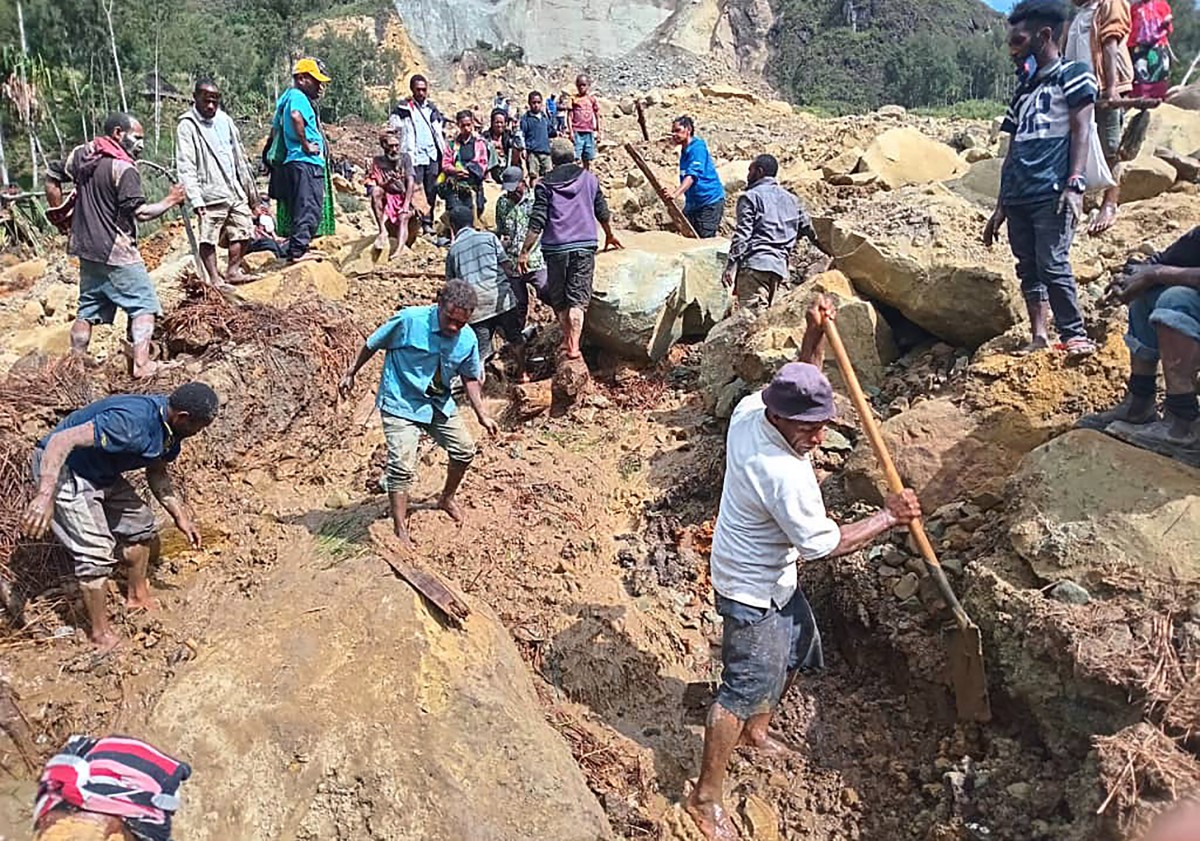Over 2,000 people buried in Papua New Guinea landslide
More than 2,000 people are feared buried in a Papua New Guinea landslide that destroyed a remote highland village, the government said Monday, as it pleaded for international help in the rescue effort. The once-bustling hillside community in Enga province was almost wiped out when a chunk of Mount Mungalo collapsed in the early hours […]

This handout photo taken and received on May 26, 2024 from the International Organization for Migration shows people digging at the site of a landslide at Yambali Village in the region of Maip Mulitaka, in Papua New Guinea’s Enga Province. (Photo by Mohamud Omer / International Organization for Migration / AFP)
More than 2,000 people are feared buried in a Papua New Guinea landslide that destroyed a remote highland village, the government said Monday, as it pleaded for international help in the rescue effort.
The once-bustling hillside community in Enga province was almost wiped out when a chunk of Mount Mungalo collapsed in the early hours of Friday morning, smothering scores of homes and the people sleeping inside them.
“The landslide buried more than 2,000 people alive and caused major destruction to buildings, food gardens and caused major impact on the economic lifeline of the country,” Papua New Guinea’s national disaster centre said in a letter to the UN obtained by AFP.
The main highway to the large Porgera gold mine was “completely blocked”, it told the UN resident coordinator’s office in the capital Port Moresby.
The landslip was continuing to “shift slowly, posing an ongoing danger to both the rescue teams and survivors alike”, the disaster centre said.
The scale of the catastrophe required “immediate and collaborative actions from all players”, it added, including the army, and national and provincial responders.
The centre also called on the United Nations to inform Papua New Guinea’s development partners “and other international friends” of the crisis.
‘Rocks are falling’
The UN is scheduled to hold an online emergency meeting with foreign governments early Tuesday.
They will try to coordinate a relief effort that has been complicated by the remoteness of the site – which is situated in Papua New Guinea’s rugged highlands – as well as the severed road link and ongoing tribal fighting nearby.
Locals and rescue teams have been using shovels and pieces of wood to find bodies under the landslide – a mix of car-sized boulders uprooted trees and churned-up earth that is thought to be up to eight metres (26 feet) deep.
“Nobody escaped. We don’t know who died because records are buried,” a schoolteacher from a neighbouring village, Jacob Sowai, told AFP.
UN migration agency official Serhan Aktoprak told AFP that the danger was ongoing: “The landmass is still sliding, rocks are falling from the mountain.”
Streams of water were flowing between the soil and debris, while cracks were appearing in land adjacent to the landslip, he added.
“This might trigger a further sliding,” the UN official warned, posing a “serious risk” both to rescuers and people living in the area.
Close ally Australia said Monday that it would provide emergency relief supplies, such as shelters, hygiene kits, and specific support for women and children.
China’s President Xi Jinping sent a message of condolences saying he was “deeply sorry” to learn of the disaster and offering assistance.
US President Joe Biden, French President Emmanuel Macron, Japanese Prime Minister Fumio Kishida and the World Health Organisation have also offered support.
